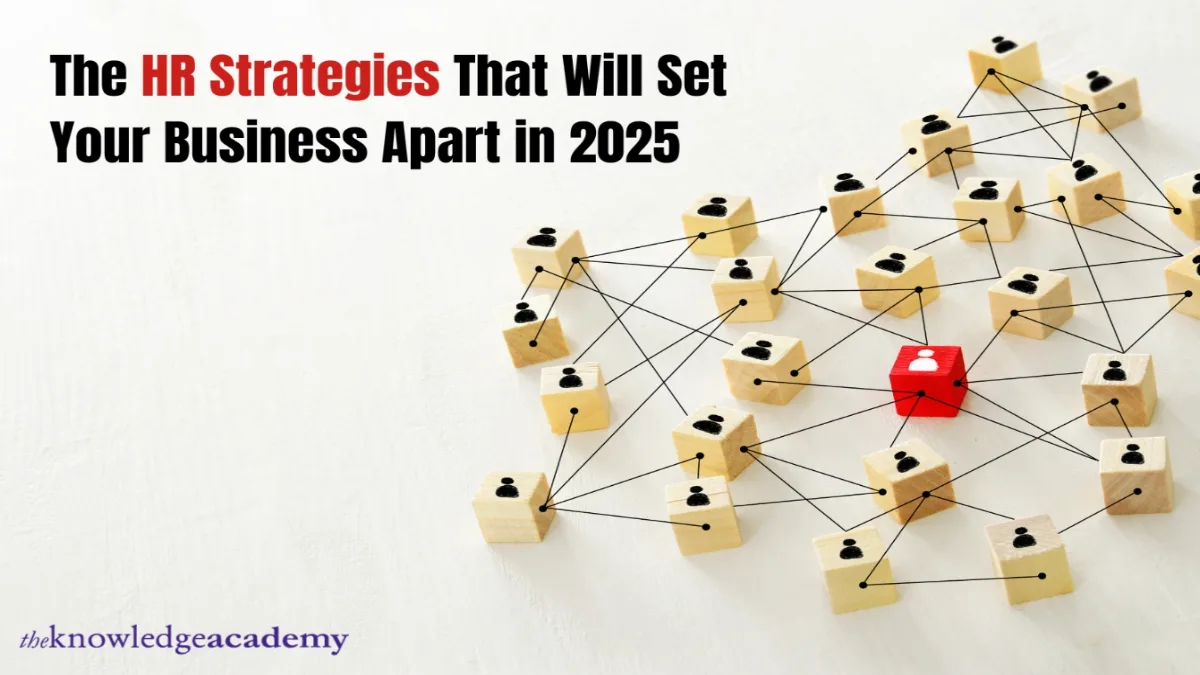
Have you thought about how a strong HR strategy can impact your business? Research indicates that effective HR strategies can boost employee engagement by 22%, resulting in increased productivity and retention, and a 17% increase in profitability. In 2025, investing in HR Leadership Certifications and adopting strategic HR practices will be key to staying competitive.
HR Strategy Examples, like taking care of employees’ health and using facts to make decisions, help create a workplace that brings in great talent and leads to long-term success.
Table of Contents
- Understanding HR Strategy
- Key HR Strategies for 2025
- Conclusion
Understanding HR Strategy
An HR strategy is a plan that aids companies in effectively managing their workforce. It emphasises selecting, educating, and retaining the best employees. A strong HR plan ensures that employees remain inspired and provide quality work. Strong HR practices help businesses remain ahead of the competition and grow more quickly.
Fair regulations and a pleasant workplace culture are also essential components of a successful HR strategy. It makes employees feel appreciated and valued in their positions. Contented employees are more productive and remain with the company longer. Companies that prioritise HR planning create cohesive teams and succeed over a long time.
Key HR Strategies for 2025
HR strategies need to adapt to the changing nature of the workplace. Employers who concentrate on crucial HR tactics will develop a driven and effective workforce. Here are the strategies that will set businesses apart in 2025:
- Prioritising Employee Well-being
An organisation which makes employees happy achieves better productivity levels. The workplace will prioritise support for mental health while simultaneously developing wellness programs and work-life balance initiatives. A company which builds a strong workplace culture will succeed in attracting and keeping top-skilled professionals. Businesses which invest in employee physical and emotional wellness enjoy both better employee satisfaction and reduced absenteeism levels.
- Upskilling and Career Growth
Employees want continuous learning. Businesses must invest in training and development. Offering mentorship, online courses, and leadership workshops will boost engagement and reduce turnover. Career growth opportunities make employees feel valued, reducing the risk of them seeking jobs elsewhere. Budgeted training sessions combined with learning platforms enable workers to acquire updated skills and understand industry changes.
- Data-Driven Decision Making
HR teams will rely more on analytics to make informed choices. Tracking employee performance, engagement levels, and retention rates will help refine strategies. Using data ensures businesses stay ahead of workforce trends. HR software and AI tools will make it easier to gather insights on employee satisfaction and productivity. Companies that use data-driven approaches will create better policies and improve workforce management.
- Embracing AI and Automation
The organisation uses automation technologies to optimise recruitment along with onboarding and performance assessment. The utilisation of AI-driven software enables HR professionals to dedicate their energies towards building relationships instead of performing repetitive tasks. This approach will improve employee satisfaction. Chatbots can handle employee queries, and AI can assist in screening candidates, making hiring faster and more effective. Businesses that use technology will reduce HR workload and enhance employee experiences.
- Diversity, Equity, and Inclusion (DEI)
Companies with diverse personnel produce greater innovation results and better decision outcomes. Businesses need to actively support their DEI initiative programs. An environment of inclusion will create positive effects on how both external and internal audiences perceive the company including improved reputation and employee happiness. All employees must have equal access to opportunities without facing discrimination based on gender, ethnicity, or background. Continuous DEI training, together with policies, will build a fair work culture.
- Flexible Work Models
Hybrid work is here to stay. Organisations which provide flexible work arrangements to their employees will achieve competitive success. Companies that offer employees both remote and on-site work flexibility will enhance productivity levels and employee job satisfaction. Companies need standardised remote work regulations, appropriate technology investments, and a safe distance between remote and office work platforms to preserve team collaboration. Employees will prioritise work-life balance heavily when selecting a workplace.
- Employee Engagement and Recognition
Recognition drives motivation. Regular feedback, rewards, and appreciation programmes will make employees feel valued. Acknowledging efforts improves loyalty and performance. Employees who feel recognised are more likely to stay committed to their organisation. Companies should implement reward systems, performance bonuses, and peer recognition to create a culture of appreciation.
Conclusion
A great HR strategy can make all the difference in how a business grows. When companies focus on keeping employees happy, helping them learn, and making everyone feel included, they create a workplace people want to be part of. Using data and technology makes things smoother, and recognising employees keeps them motivated. If you want to boost your HR skills, The Knowledge Academy offers great training to help you stay ahead.
